Faroe Islands: Why foreigners play in Europe's most remote league
- Published
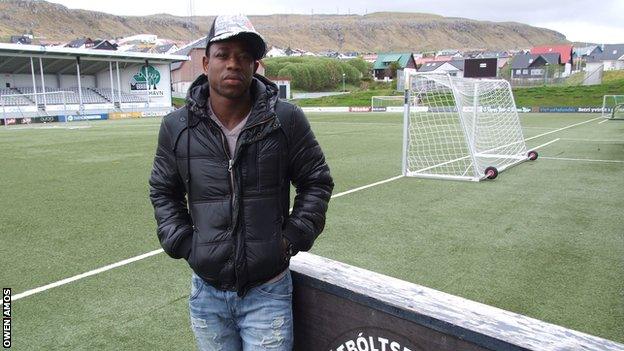
Ibrahima Camara, a Senegalese forward at home in the Faroes
The Faroe Islands are a long way from anywhere.
Midway between Iceland and Norway, around 200 miles north of Scotland, the country sits in the wind-whipped North Atlantic.
The national team are improving fast: ranked a best-ever 102nd in the world, just below Macedonia, they shocked Europe by winning 1-0 away in Greece last year.
The return match takes place on Saturday evening in the tight, sold-out stadium in Torshavn.
But while the national team basks in the spotlight, the national league waits in the wings. The Faroes' top division is ranked 41st out of 54 associations belonging to Uefa. The average attendance last year was around 500.
Look closely, though, and it becomes clear that this remote and unassuming league attracts footballers from around the world.
Twenty-five foreigners - from 14 countries including Brazil, Nigeria, and the United States - have played in the top division this year.
So why do they migrate to this rocky outpost, where crowds are sparse and the average temperature in summer is only 13C?
Their answers reveal much about the shrinking world of modern football, where players will go anywhere - even 62 degrees north - for a contract.
Dreaming of Europe - but never the Faroes
France, Belgium, England? The African lad who fulfilled his dream in an unexpected place.
Ibrahima Camara, a 23-year-old Senegalese forward, came to the Faroes in 2010. He signed for B68, a club in the village of Toftir, population 823.
"I arrived in winter," he says, shivering at the memory. "It was very cold."
As a youngster, Camara played for one of Senegal's biggest clubs, Diaraf. Like most African players, he dreamed of Europe.
"But France or Belgium, perhaps England," he says. "Never the Faroe Islands."
When a friend moved to England, he introduced Camara to a Senegalese agent based in Portsmouth. Camara sent him videos, and the agent set up a move to Al Shabab, a club in Dubai.
Camara trained there for six months, but Al Shabab couldn't agree terms with Diaraf. A move to Iran fell through, and trials at Le Havre and Toulouse in France were cancelled because he couldn't get a visa.
Finally, the agent suggested the Faroes: the last resort in the land of plenty.
"When I came, I only thought about leaving," he says. "I only spoke French. It was hard for me."
Camara stuck with it and, this year, earned a move to the Faroese champions B36.
He still dreams of France or Belgium, but, after six years, the Senegalese is at home in the Faroes. He even works part-time in a bakery.
"When I go to football, I don't lock my apartment door," he says. "I have been here six years and I haven't seen any crime. The life is very calm."
From Ware FC to where exactly?
Living the alternative student life over in the Faroes.
In January, Albert Adu played in the eighth tier of English football for Ware FC, a semi-professional club in Hertfordshire. He is now one of the leading scorers in the Faroes, with nine goals so far this season.
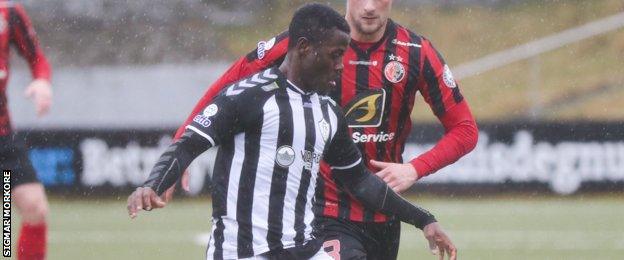
Albert Adu in action for the oldest club in the Faroes, TB Tvoroyri
But when his agent proposed the move north, it was less a case of Ware, and more a case of "where?"
"I didn't know about the Faroes," he admits. "I had to look them up."
Adu was born in Ghana and grew up in Amsterdam. Aged 16, he moved to England with his family.
While playing youth and non-league football in north London, he met an agent who proposed a move to CD Comarca de Nijar, a club in the Spanish fourth tier.
With accommodation and a full-time wage, he stayed in Spain for 18 months, until the club's money ran out. He returned to the lower reaches of English football, taking an office job at the family firm to make ends meet.
"I enjoyed my time playing for Ware, but I wanted to move back to full-time football," he says.
"My agent said: 'If you're prepared to move anywhere in Europe, I can find you something'. Last year he told me about the Faroe Islands."
Adu went to the Faroes for a week in August to see the club, TB. Impressed by the welcome, and the history, he agreed to sign full-time.
He now lives in a house with three other foreign players - two Icelanders and one from the Ivory Coast.
"It was a bit messy at first, a bit studenty, but we've got better," said the 26-year-old.
That five-bedroom house on Tvoroyri - itself a two-hour ferry ride from Torshavn - is a long way from the streets of Amsterdam, where Adu learned to play the game.
"It's been an amazing journey," he says. "Things never go the way you plan them, but I've enjoyed it all."
Ten years on - a passport, a wife, two daughters
The boys from Brazil who didn't quite follow in Kleberson's footsteps.
Outside the home changing room at HB's stadium in Torshavn two Brazilians catch up in Portuguese.
One is Clayton Soares do Nascimento, a 36-year-old forward, who's playing his 13th season in the Faroes. He's now at his fourth club, IF.
His compatriot is Alex Jose dos Santos, a left-sided defender, still quick and classy at 34. This is his 12th season in the Faroes; HB is his third club.
Unlike Ibrahima Camara, Santos never dreamed of Europe. When you're from Brazil, you don't have to.
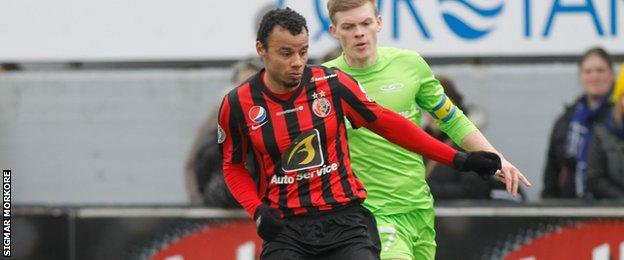
The Brazilian Alex Jose dos Santos playing for HB, his third Faroese club
But when a Croatian agent arrived at his football school in Sao Paulo, a move became possible. Aged 21, Santos signed for Opava in the Czech second division.
"My agent was very good," he remembers. "At the same time, he took Kleberson from a Brazilian club to Manchester United. He told me: 'One dream has come true, maybe yours will too.'"
After helping Opava to promotion, Santos moved to Frem in the Danish top division. The Brazilian made just two appearances in the league. In his second, he was subbed on and subbed off.
"I tried to play well, but I was too nervous," he says. "The coach said: 'I like you, but I think you should spend time in the second team.'
"I thought: 'No chance. I've come from Brazil, I don't want to play for the second team.' I said I wanted to go home."
Instead, the president arranged a move to the Faroes. Santos looked at the map: after the Czech Republic and Denmark, it looked, and felt, like the end of the line.
"After my first year with B36, in 2004, I went home and didn't want to come back," says Santos. "In 2005, they asked me to return. I thought: 'It's too difficult.' But the contract was good."
So he came back. Ten years later, Santos has a Faroese passport, a Faroese wife, and two daughters.
"Brazil is too criminal," he says. "Someone is stabbed every five seconds in Sao Paulo. When you take money out, you're always looking.
"Here, you take money out and nobody cares. I like the people here."
Never in a million years
The college star still dreaming of the big time.
In January 2014, Mayowa Alli could see the big time. As one of the best players in US college soccer, he was part of the 2014 Major League Soccer superdraft., external
He could have joined one of the biggest clubs in the country - but of the 267 players in the draft, only 76 were signed. Alli wasn't one of them.
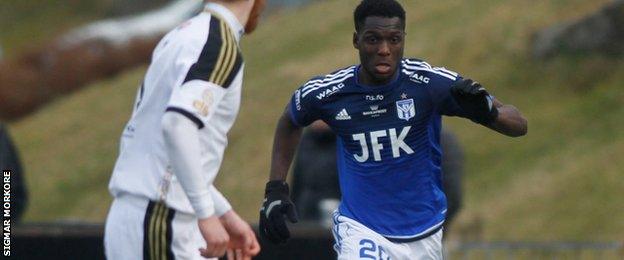
Mayowa Alli: born in Nigeria, raised in the US, now playing in the Faroe Islands
Fast forward 18 months and he is in the Faroes: working four hours a day as a carpenter, and building his career from the bottom up with KI Klaksvik.
"I never thought in a million years I'd end up here," he says. "If you'd told me that four years ago I would have laughed."
After missing out on the MLS, Alli looked abroad. A player from his college, Conor O'Brien, moved to Denmark in 2010, and now plays in the Austrian Bundesliga, so Alli went on trial at Jammerbugt in the Danish third tier.
It went so well, he ended up signing a two-year deal with Vendsyssel in the second tier.
After a handful of games, the club decided to send him on loan. And so he arrived in Klaksvik, the second biggest town in the Faroes, in January.
"People my age, when they finish college they tend to go travelling," he says. "I'm travelling as well - but I'm playing football at the same time."
At only 23, he has time - and ability - on his side. Might he even make it to the MLS, the league that rejected him?
"I just want to reach my full potential," he says. "I know that's a cliched answer, but I want to go as far as I can. Whether that be Danish top division, the Premier League, the MLS, I don't know."
And, if all else fails, he can fall back on carpentry.
"I didn't have to do it, but it keeps me busy before training," he says. "I'm getting better at it. I would consider myself handy-ish now."
They told me to buy some more clothes
Helping out a mate but finding somewhere to call home.
Aleksandar Djordjevic came to the Faroes in 2001, wearing shorts and T-shirt. His research, he admits, wasn't thorough.
"When I changed flights in Denmark, I told the information desk I was going to the Faroe Islands," he says.
"I said: 'It's a little south of here, isn't it?'
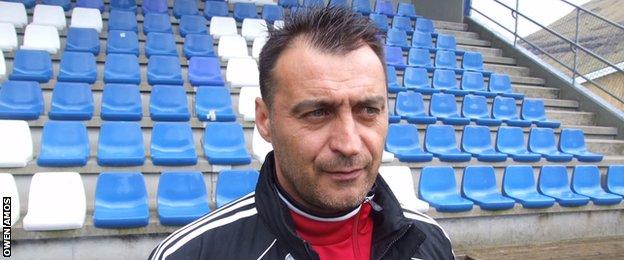
Aleksandar Djordjevic: 14 years in the Faroes and counting
"The woman said: 'No, it's north - go and buy some clothes.' So I did."
His move to KI Klaksvik was a favour to their Serbian coach: the last stop on a long career that saw Djordjevic play hundreds of times for Partizan Belgrade, captain a Yugoslavia Under-20 side including Zvonimir Boban and Davor Suker, and play in Australia and Switzerland.
He expected to stay for six months. Fourteen years later, Djordjevic is still in Klaksvik, taken by its snow-capped beauty.
"I saw the same thing you see," he says, pointing at the harbour and the mountains behind. "That's why I stayed.
"When you're younger, the Faroes can be a first step to playing in Scandinavia, or somewhere else in Europe.
"When you're 30 or older, you just want a place you can live normally. For me, it's now home. I still have a home in Belgrade - I go to visit, no problem. But it's too fast for me."
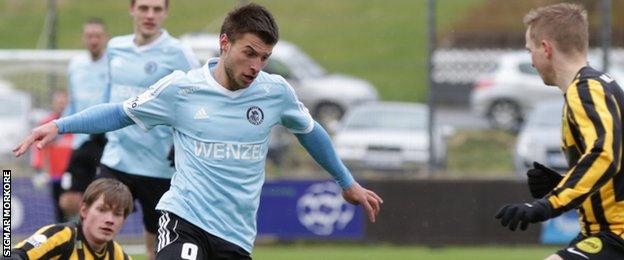
Filip Djordjevic is one of the most highly rated players in the Faroes
Djordjevic, now 46, played regularly for KI until 2006. He was recently in charge of the Faroes' women's team and now runs the combined women's team of B36 and AB Argir.
And there is still a Djordjevic on the pitch in the Faroe Islands: Aleksandar's 21-year-old son, Filip, plays for top division side Vikingur.
When he gets his passport, the forward is expected to play for the Faroes' national team - "He's in the top three players in the league, no problem," says his father.
If it happens, he will personify the worldwide migration of footballers.
Born in Australia, while his dad played there, to Serb parents: Filip Djordjevic, the Faroe Islands international.
- Published12 June 2015
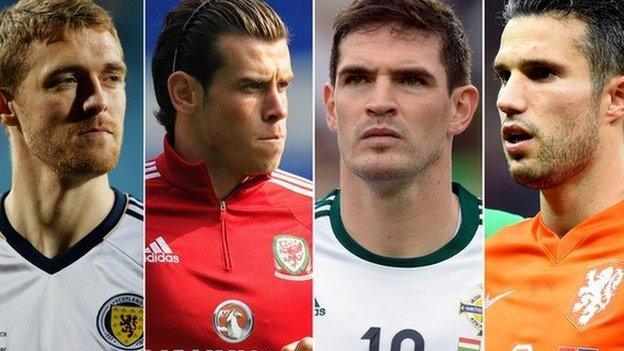
- Published12 June 2015
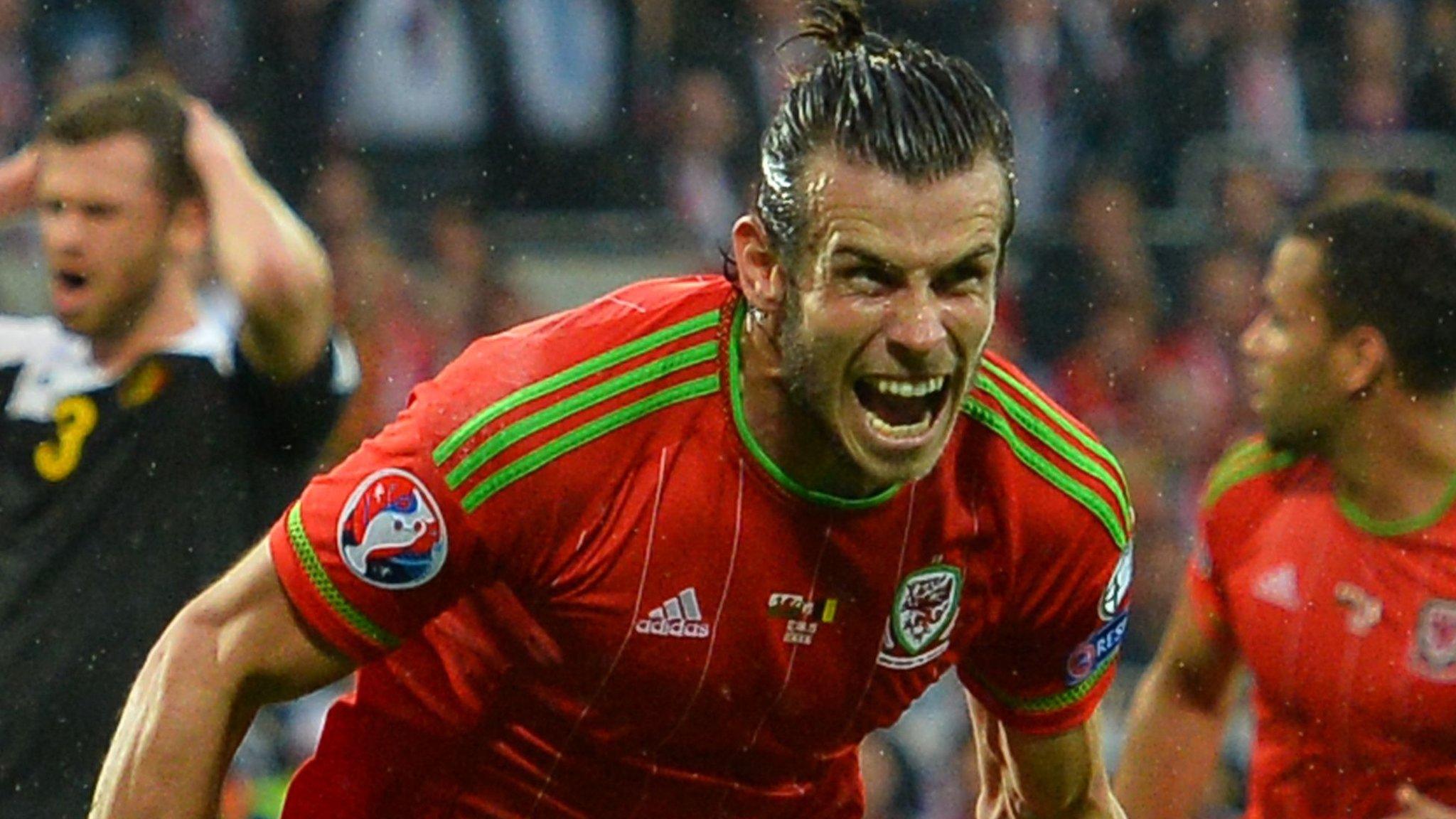
- Published12 June 2015
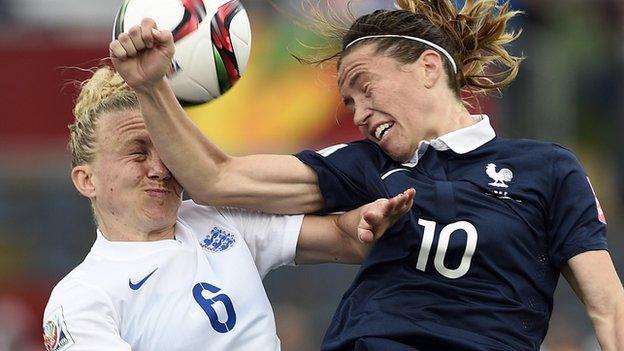
- Published20 June 2016

- Published7 June 2019
